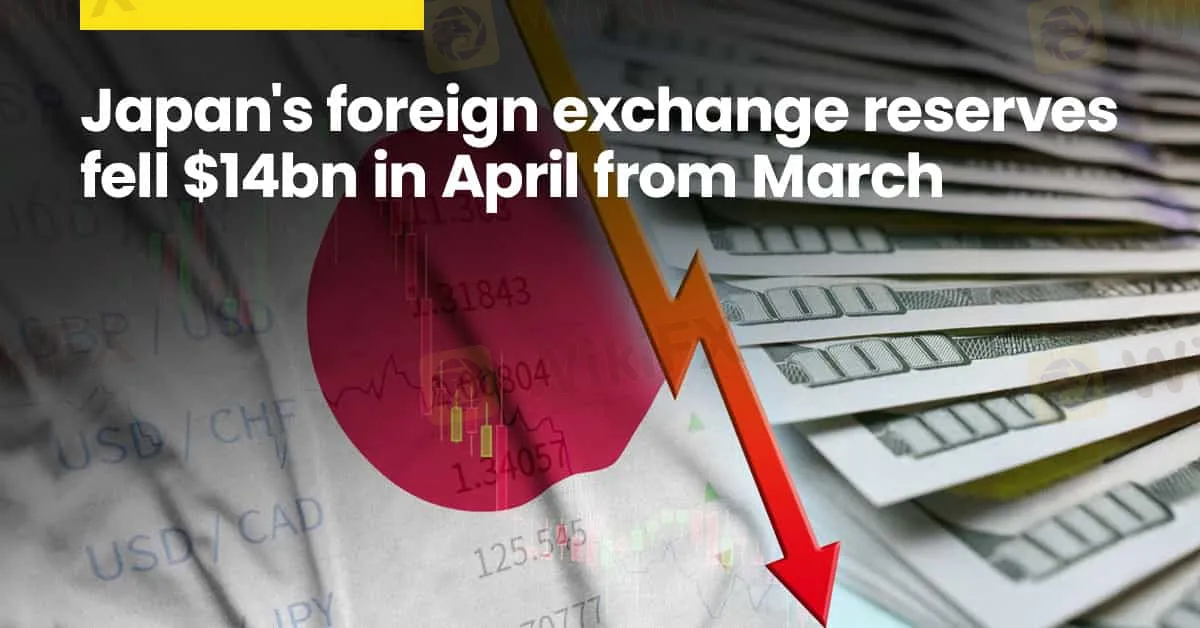简体中文
繁體中文
English
Pусский
日本語
ภาษาไทย
Tiếng Việt
Bahasa Indonesia
Español
हिन्दी
Filippiiniläinen
Français
Deutsch
Português
Türkçe
한국어
العربية
Japan's foreign exchange reserves fell $14bn in April from March
Abstract:In April, Japan experienced a significant decline in its foreign currency reserves, with a drop of $14 billion largely attributed to the decrease in the value of foreign securities holdings.

In April, Japan experienced a significant decline in its foreign currency reserves, with a drop of $14 billion largely attributed to the decrease in the value of foreign securities holdings.
According to a finance ministry report released on Thursday, Japan's forex reserves fell to $1.14 trillion in April. This decline was primarily driven by a decrease in holdings of foreign securities, which decreased from $995 billion to $978 billion compared to the previous month. The decrease in securities holdings was anticipated due to a drop in the market value of overseas assets, including Treasuries, as yields rose.
This data follows speculation that Japan intervened in the market twice to support the yen, with the first intervention occurring at the end of April. While Japanese officials have not confirmed any intervention, a Bloomberg analysis of the central bank's current account suggests that the nation likely entered the market twice last week. The estimated amount of yen bought during the first action is approximately ¥6.2 trillion ($40 billion), based on updated data and money broker estimates.
Japanese officials have consistently maintained a strategy of neither confirming nor denying intervention, leaving investors to infer market moves. Finance Minister Shunichi Suzuki and his deputy declined to confirm any interventions when questioned by reporters last week and earlier this week, respectively.

Disclaimer:
The views in this article only represent the author's personal views, and do not constitute investment advice on this platform. This platform does not guarantee the accuracy, completeness and timeliness of the information in the article, and will not be liable for any loss caused by the use of or reliance on the information in the article.
Read more

Trading is an Endless Journey
Every trader dreams of quick success, but rushing the process often leads to mistakes. It’s easy to get swept up in the excitement of winning trades or discouraged by unexpected losses. The truth is, mastering the emotional side of trading can be even more important than understanding market analysis or strategies.

How to Know if the Market is Correcting or Reversing?
In trading, distinguishing between a market correction and a market reversal is crucial for making sound decisions. Misjudging one for the other can lead to missed opportunities or significant losses. While both involve price movements, their causes, duration, and implications differ substantially. Understanding these differences can help traders improve their strategies and adapt to market conditions effectively.

Empowering the Next Generation in Finance with WikiFX: Gen Z’s Investment Journey
With a steadfast commitment to fostering sustainable financial literacy and providing clear, strategic guidance to the next generation, WikiFX has collaborated with Van Lang University and Hoa Sen University to host an exclusive series of financial education workshops. This marks a pioneering initiative by WikiFX in Vietnam, designed not only to deliver foundational knowledge but also to instill a sense of responsibility and cultivate prudent financial decision-making among aspiring young traders.

Robinhood Launches Options Trading in the UK by 2025
Robinhood to introduce options trading in the UK by 2025 following FCA approval. Discover how this expansion aligns with Robinhood's strategy for global growth and new features.
WikiFX Broker
Latest News
Russia to Fully Ban Crypto Mining in 10 Regions Starting January 1, 2025
Why is there so much exposure against PrimeX Capital?
Two Californians Indicted for $22 Million Crypto and NFT Fraud
RM62k Lost Investment Scam After Joining XRP Community Malaysia on Telegram
Victims of Financial Fraud in France Suffer Annual Losses of at Least €500 Million
WikiFX Review: Is Ultima Markets Legit?
Colorado Duo Accused of $8M Investment Fraud Scheme
What Impact Does Japan’s Positive Output Gap Have on the Yen?
Macro Markets: Is It Worth Your Investment?
Malaysia Pioneers Zakat Payments with Cryptocurrencies
Currency Calculator


